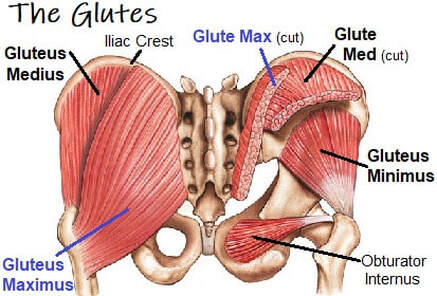 Your gluteal muscles are one of the largest and most powerful muscle groups in the body, but they can also cause a lot of grief if not given enough attention! What are the ‘Glutes’? Your gluteal muscle group is made up of three main muscles; gluteus maximus, gluteus medius and gluteus minimus. Each individually play a part on moving the leg and acting on the hip joint and pelvis.
What can weak glutes cause? Lower back pain: As we have previously mentioned, the muscle groups within our body are all inter-related and can act upon one another. The glute max provides lower back stability through its connection and relationship with the muscles deep within the back that help us to stand up straight, and the connective tissue that surrounds them. If the glute max is weak and fails to contract when we are doing movements that involve lifting or bending, then extra load and pressure is placed on the lower back extensor muscles. This over time can cause lower back pain to develop due to muscle tightness or even deeper joint injuries. Poor knee stability/ pain: As stated above the glutes can impact on the surrounding joints and specifically the anterior portion of the knee joint. When your glutes are weak and in particular glute med, it can cause the leg to internally rotate more than it should, due to the quadricep muscle group at the front of the leg being stronger or tighter than the glutes. This as a result increases the pressure on the knee cap and can cause pain at the front of the knee. Overtime it can cause more serious alterations such as knee valgus or ‘knock knees” to occur. Hamstring strains: Weak glutes can often cause poor movement patterns and incorrect activation sequences to develop. If the glutes are not activating during a movement then it causes a different muscle to overcompensate and this can often be the hamstrings. The glute muscles are predominantly stabilisers of the hip and when they do not activate first it can cause the hamstring to try and both stabilise and produce power during a movement. Over time this can cause the hamstring to become more prone to strains, tears or niggles. Hip pain: When the glutes can’t produce enough force during hip extension there is an increase in forward movement within the hip joint capsule. This increased forward angle can eventually lead to a higher amount of force and wear and tear within the hip joint. This can cause conditions such as osteoarthritis and other joint related injuries to develop or progress at an increased rate. These are just a few of the common injuries that weak glutes can cause, but they can contribute to so many more! If you feel that you may be suffering from some weak glutes head on over to our Facebook page to learn some glute specific strengthening exercises that can help! By Aleisha Michael
0 Comments
Your comment will be posted after it is approved.
Leave a Reply. |
AuthorSLisa Parkinson Archives
July 2024
Categories
All
|

 RSS Feed
RSS Feed